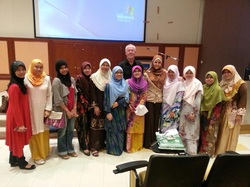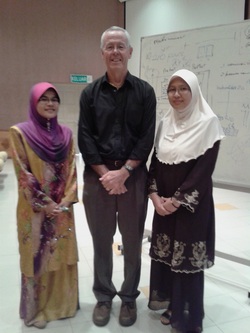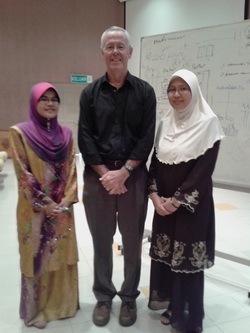
INTRODUCTION
The Rasch model provides human science researchers (including psychologists, social workers, educators, medical practitioners and researchers, engineers, managers etc.) with a conceptual and analytic tool to develop, utilize and monitor high quality measures of latent variables such as attitudes, traits, and abilities. In turn, high quality measurement is likely to have a positive impact on research as well as educational outcomes. Current development in measurement and evaluation practices reveal that the application of Rasch measurement techniques is rapidly increasing in popularity and is becoming the norm for establishing the quality of the measurement tools used in the social sciences.
The workshop is structured to provide the theoretical background of measurement and fundamentals of the Rasch Model. Prof. Bond will demonstrate how to design research study applying the Rasch model, and subsequently interpret the results for publications. Certainly, this workshop is ideal for supervisors and educational researchers with NO BASIC knowledge of measurement theories. Researchers interested in learning how to implement the Rasch Model to their own research data are encouraged to attend the workshop.
This workshop is tailor-made for academicians and post-graduate researchers at the Faculty of Education but relevant and applicable to others from inside and outside of UKM with the same background in research. Thus, it is structured preferably for not more than 60 participants.

SESSION SINOPSIS
Day 1 (15.2.13) sessions are about the fundamentals of measurement focusing on Human Sciences because much is to be gained by learning how to work incrementally to achieve high standard of measurement. Shortcomings of classical theories will be discussed and important principles of measurement will be introduced followed by the Basic Principles of Rasch Model.
Day 2 (18.2.13) will introduce the simplest model in Rasch measurement, the dichotomous model in order to explain how to build a set of items for measurement. The idea of measuring one single construct at a time will be raised. The next session will discuss about Invariance, a crucial property of scientific measurement.
Day 3 (19.2.13) will extend principles introduced in the previous session to polytomous data. The session will elaborate on the use of Likert scales, one form of polytomous data that has been around for a long time to collect attitude data. The Partial Credit Model which incorporates the possibility of having differing number of response opportunities for different items on the same test will next be introduced
Day 4 (20.2.13) will first discuss about rating scale design because as it is commonly regards, the way each rating scale is constructed has a great influence on the quality of data obtained from the scale. Next, the most contentious issue in Rasch measurement circles that is the Fit analysis followed by the concept of unidimensionality which reflects the Rasch model’s focus on the process of fundamental measurement will be discussed.
Day 5 (21.2.13) will focus on reporting Rasch analysis for journal and post-graduate thesis.
Day 6 (22.2.13) will focus on Advance problems and issues in Rasch measurement in practice.

BIODATA OF ADJUNCT PROFESSOR TREVOR BOND
Profesor Trevor Bond is an Adjunct Professor at the Faculty of Education, Universiti Kebangsaan Malaysia and at the School of Education, James Cook University, Australia. He is internationally regarded for his work on the application of Rasch analysis to developmental variables and educational outcomes.
He is also a specialist reviewer for journals across a wide range of Human Sciences and provides consultation to organizations involved in high-stakes educational testing in the US, UK and Europe. In 2005, he instigated PROMS: the Pacific Rim Objective Measurement Symposia to support the development of measurement capacity in S.E. and Eastern Asia. The second edition of his best-selling current book (co-authored with Christine Fox), Applying the Rasch model: Fundamental measurement in the Human Sciences, reflects his longstanding experience in educational settings as the background for applying fundamental measurement to outcomes in the human sciences. Prof. Bond is a regular presenter on topics of educational measurement and conducts Rasch measurement workshops in the U.S., S.E. Asia, Australia and Europe, in particular. Until recently, he was Head of the Department of Educational Psychology, Counselling & Learning Needs, at the Hong Kong Institute of Education.

 RSS Feed
RSS Feed